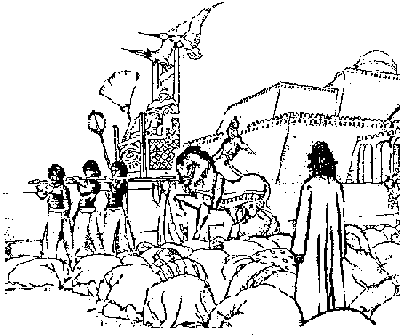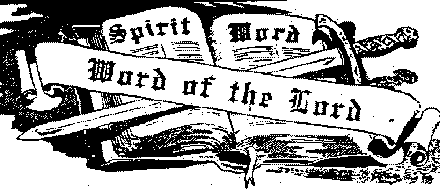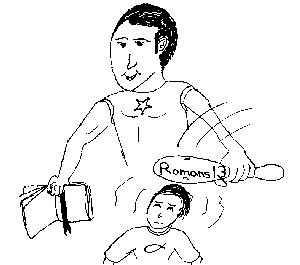Introduction
The way we view Romans chapter 13:1-7 greatly determines the way we interact with the governments of men. The ideas we are about to set forth are radical, even revolutionary. They will overthrow many sacred “traditions” among those who claim to be followers of Jesus.
True Christianity is a way of life which involves renouncing the world and pledging our allegiance to the Kingdom of God. There is an inherent conflict between the old kingdom we have come out from and the new Kingdom to which we now belong. Jesus was crucified as a result of this conflict. He has assured us that if we are true to His word that we can expect the same kind of treatment. “I have given them thy word; and the world hath hated them, because they are not of the world, even as I am not of the world” (John 17:14).
To try to combine the humanistic governments of men with the Spirit government of God is an impossible task. Any attempt to combine the governments of men with God’s government is doomed to failure. Nevertheless, throughout history politicians have attempted to mix the holy and the profane. They have borrowed heavily from God’s law in order to appear righteous, yet man is still left in control. This strange mixture is often called “God inspired government” or “Government based on God’s laws.” As a result, multitudes of Christians have been brought into bondage to patriotism and nationalism. They have been forced to submit to manmade governments under the pretext that God has commanded our submission in Romans 13:1-7.

Spirit Revolution
Since around the 4th century AD many have been led to believe that manmade governments actually possess authority to rule over God’s people. A misinterpretation of Romans 13:1-7 is used to support this belief.
The average churchgoer believes that Christians should be satisfied with the humanistic governments of men, obeying the laws of the land. They don’t stop to consider that God desires His people to live under His Spirit government.
The crux of the matter is this: Does Paul, in Romans 13:1-7, argue that the civil governments of this world have legitimate authority over the people of God?
We believe that the obedient people of God are not bound to obey the manmade civil governments of this world. God’s people are answerable to God above all else and are bound by His commands. At the same time, God’s people are not to use their liberty as a cloak for evil, to foment rebellion in the flesh, or waste time trying to politically influence the governments of this world.
Furthermore, we believe Paul, in Romans 13:1-7, is referring to the spiritual leaders of the Body of Christ, not the civil authorities of this world. Remember that the true followers of Jesus are Spirit people whose lives should reflect the fact that they belong to another Kingdom, the Kingdom of God. Their stay on earth is only transitory.
As citizens of Heaven, we are bound to submit and pledge allegiance to the King of Heaven and His government over us. We are not bound to submit to the government of some nation just because we happen to be living within its borders.
Romans 13 has been wrongly interpreted by ruling civil governments to mean that Christians should submit to them. Combined with nationalism and patriotism, a powerful weapon has been formed to neutralize and misdirect the power of God’s Kingdom within His people. The idea that God’s government is to be subordinated to the civil governments of this world is a deception that must be exposed.
Be Not Afraid of Their Faces
This does not sit well with those in civil governments who claim to have power and authority to rule over other men. Throughout history, those who have declared independence from the systems of this world and dependence upon God, have almost always encountered violent reactions. They were frequently persecuted unto death by the “civil” authorities. It will be the same today for anyone who will break all allegiances and ties with this world and declare Jesus Christ as their Sovereign King.
This does not mean Christians are out to cause trouble or overthrow the governments of this world. On the contrary, Christians make the best citizens because they strive to obey the laws of God, which are far superior to the feeble attempts of men at lawmaking. Actually, the true Christian’s goal is to live a life pleasing to God and win souls to Christ. This is hardly a threatening activity! We seek to obey Paul’s advice in Romans 12:18, “If it be possible, as much as lieth in you, live peaceably with all men.”
Yet, the rulers of the nations of this world view this type of separation unto God as a serious offense. When a group of people refuses to pledge allegiance to their authority, that group is considered a threat to “national security” and dealt with accordingly. It was the same with King Nebuchadnezzar, who was determined to destroy anyone who would not bow down to his image.
Who are the Authorities?
In Verse 1, the Interlinear text reads, “Let every soul be subject to authorities above him.” The word translated authorities, or powers in the King James version, is the Greek word exousia. (Strong’s #1849) The most crucial question in this study is, “Who are the exousia or authorities that Paul was referring to in this verse?”
Traditionally 99% of the church world has interpreted this passage to mean that Paul was referring to the manmade civil governments of this world. The governments of the world have been quick to place their “stamp of approval” on such an interpretation. Imagine the advantage enjoyed by worldly rulers when they can point to the Christians’ own sacred writings for proof that Christians should submit to their authority.
It is not obvious from the original Greek text what authorities Paul was referring to in Romans 13. He does not specifically state that he is referring to civil government authorities anywhere in these verses.
It is our belief that the authorities or powers that Paul was referring to in Romans 13:1 were the spiritual leaders of the Body of Christ in Rome. Paul was notexhorting the Christians in Rome to submit to the Roman Empire. He was exhorting them to submit to their own government – to the spiritual leaders whom God has placed over the Ecclesia (called-out ones) to guide it by His Spirit.
God has always appointed leaders over His people such as Moses, Joshua, David and the Apostles, including Paul. He has invested those leaders with the authority to rule. Paul could easily have been speaking about Christian authorities within the Ecclesia. Why would Paul be directing the Roman Christians to obey the authorities of the Roman Empire when they had their own leaders to obey? Obviously, he was not.
Doctrine of Confusion
In verse 4 of the Greek text, Paul refers back to the authority three times in the singular, using the word “it.” (“he” in the King James version) Paul tells us “it” is a servant to us for good; “it” does not wear the sword in vain; and “it” is a servant of God.
Civil governments of this world rarely, if ever, meet these three points. You would expect them to, if Paul was indeed referring to them. Many times civil authorities stand in total opposition to the gospel and cruelly persecute God’s people, just as Jesus said they would (John 15:20). In contrast, godly authority, exercised by God’s leaders, will always meet these three qualifications and act as a “servant of God” for our good.
When we realize Paul was talking about spiritual leaders of the Body of Christ in verse 1, the following verses become much clearer. We can focus on the fact that God has His own government which operates under His authority. As His followers, we are expected to submit to that authority which is invested in His leaders.
Civil governments make demands of those who happen to be living within their territory. These demands often openly contradict the gospel and the law of God. For the true Christian to submit to such commands would be sin. Yet according to the “civil government” theory of Romans 13, Christians are supposed to submit to the “laws of the land.” This brings confusion and God is not the author of confusion.
Confusion is eliminated when we realize Paul was not commanding submission to manmade civil governments, but to God’s government. The blood of the martyrs bears witness to the fact that true Christians throughout history have come to this conclusion. They have been persecuted and killed by “civil” governments on every continent because they were determined to submit to God’s government and refused to obey the commands of men which opposed or contradicted God’s laws.
Why Submit to Spiritual Authority?

Verses 2 through 5 give us several important reasons why we must submit to true godly authority. First of all, Paul says if you resist God’s leaders, that you are in all respects resisting God. Those who resist will receive damnation. He goes on to explain that God’s leaders are not a terror to good works. We need not be afraid to submit to godly authority if our hearts are dedicated to God.
In verse 4, Paul explains that godly authority is actually our servant if we desire to do what is right. At the same time, he warns us that if we do evil the same authority will become an avenger and execute God’s wrath upon us. What a clear and beautiful picture of godly authority and how it is meant to function in the Body of Christ. Additionally, each one of the above points can be supported by numerous scriptures, which is always a characteristic of solid godly doctrine.
This kind of true godly authority is rarely found in the religious systems of today. As a result, many become confused. They end up believing Paul must be talking about civil governments who punish according to their own humanistic definitions of good and evil, which fluctuate from day to day.
The spiritual authority described by Paul has all but vanished from the Body of Christ. As a result, evil works are not punished and sin runs rampant among God’s people.
Paul sums up his arguments in verse 5 by stating the two main reasons why we must be subject to godly authority: 1) because of wrath, or the fear of God’s judgement, and 2) because of conscience.
Continuation of Chapter 12
In chapter 12, Paul has been dealing with the mutual responsibilities and duties between Christians in the Body of Christ. This also clearly points to the fact that chapter 13 is a definite continuation along the same lines. There is nothing in the letter to indicate why Paul feels it necessary to so positively and quickly change from one subject to another without explanation.
Nothing in chapters 12 or 13 supports the idea that Paul has switched his focus in chapter 13 to discuss the Christian’s relationship to civil government. In fact, the context clearly supports the contrary: Paul was dealing with spiritual authority within the Body of Christ and the individual members’ relationship to that authority.
Rulers
In verse 3 is the Greek word arkhone, which is translated as rulers in both the King James and the Interlinear text. The definition in Strong’s concordance is, “A first in rank or power, chief, ruler, magistrate, prince.” Every other instance of this word in the New Testament refers to Jewish (religious) leaders in Israel, not civil leaders.
Servants
Another important Greek word is diakonos, which is translated minister orservant twice in verse 4. Strong’s concordance defines this word as “An attendant, a waiter at a table or other menial duties; specifically a Christian teacher or pastor; deacon, minister, servant.” Paul uses this word to describe the authorities in verse 1. This strongly supports the fact that he was talking about God’s leaders. This is the same root from which we get the word deacon, a widely used term to describe leaders in the church (1 Timothy 3:8; Philippians 1:1).
A true leader of God’s people will be a servant of all. Jesus said, “But he that is greatest among you shall be your servant” (Matthew 23:11). Paul’s description of the authorities as diakonos (servants) reinforces that God’s leaders are actually the greatest servants to the Body of Christ.
Nowhere in the New Testament do we find civil authorities or officials described as servants of the body of Christ. Yet there are numerous examples of God’s leaders acting as servants to God’s people. That is why Paul would be exhorting the Roman Christians to submit to those whom God has placed in authority over them. These leaders were actually their servants in the Spirit, sacrificing their lives to lead God’s people.
The Sword – Figurative or Literal
 The next important Greek word is machaira, which is the Greek word for sword found in verse 4. This verse is often used as proof that Paul was talking about civil authorities, since God’s leaders do not use weapons to enforce God’s will. Strong’s Concordance defines machaira as, “A knife or dirk; figuratively – war, judicial punishment; a sword.”
The next important Greek word is machaira, which is the Greek word for sword found in verse 4. This verse is often used as proof that Paul was talking about civil authorities, since God’s leaders do not use weapons to enforce God’s will. Strong’s Concordance defines machaira as, “A knife or dirk; figuratively – war, judicial punishment; a sword.”
Is there a sword entrusted to God’s leaders to execute judgment in the Body of Christ? If so, could Paul have been referring to this sword in verse 4?
The answer is found in Ephesians 6:17, “And take the helmet of salvation, and the sword of the Spirit, which is the word of God.” And again in Hebrews 4:12 we read,“For the word of God is quick, and powerful, and sharper than any twoedged sword, piercing even to the dividing asunder of soul and spirit, and of the joints and marrow, and is a discerner of the thoughts and intents of the heart.”
Ananias and Sapphira were struck dead by the sword of the Spirit which came out of Peter’s mouth (Acts 5). Paul also executed judgment upon Elymas the sorcerer, as the sword of the Spirit speaking through Paul blinded the man (Acts 13:11).
It is not unreasonable to assume Paul was referring to this figurative sword of the Spirit in verse 4. Obviously, the Spirit sword is just as effective in executing judgment as any physical sword. And God invests His true leaders with this authority.
Supporting the Government
Another important word which we need to examine is foros, which is translated as tribute. This is again used as proof that Paul was commanding submission to the civil authorities – especially those who collect taxes! The word foros refers to a tax, being a general assessment of one’s property and possessions. This tax was generally collected by civil governments such as the Roman Empire.
Paul was dealing with many new converts who had been raised in Roman society. Taxing was a commonly accepted fact of life. It is quite possible that Paul was describing their responsibility to give of what they had in support of God’s work. He used the term “tribute” as a word they could easily understand. Paul was reinforcing the idea that Christians were no longer citizens of this world, but had come under their own government. If they wanted to enjoy the benefits of God’s government, they were obligated to support it.
The world requires tribute to support their governments, which often serve their people very poorly. God’s true leaders keep the Body of Christ clean, healthy and functioning properly. How much more should Christians be willing to support the government of God’s Ecclesia with a portion of their personal wealth.
God’s leaders need to be supported by those whom they serve, just as the civil servants of the world require support. Paul used the common Roman term tribute to remind God’s people to “render therefore to all their dues.”
Fear God or Man?
In verse 7, Paul commands that fear be given to the authorities who deserved it. Paul had been whipped, beaten, stoned and imprisoned at the hands of “civil” authorities for refusing to compromise the gospel. Why would he exhort his fellow Christians to fear the authorities who worked for the manmade governments of this world?
One of the great themes of God’s Word is that we are to fear and obey God alone, regardless of what “authorities” in the kingdoms of men have to say (Daniel 3:18; Acts 5:29). Yet it makes sense that Paul would exhort the Roman Christians to respect and honor the leaders of the Ecclesia. For they are appointed by God and entrusted with the Sword of the Spirit to execute judgement among them.
Conclusion
As the followers of Jesus Christ, we belong to a new Kingdom, the Kingdom of Heaven. This Kingdom has its own government, its own laws and its own leaders. Paul was not commanding us in Romans 13 to submit to the civil authorities of the kingdoms of the world. He was commanding us to submit to the authority of God’s leaders who oversee the Ecclesias, or spirit communities of God’s people.
There is no denying that true Christians make the best citizens. Their primary concern is obedience to God, and second, the reconciliation of lost humanity to God. Man, in his separation from God, does not think highly of the Christian’s objectives. As a result, the governments of this world try to coerce Christians to abandon their course and submit to them. When these situations arise, Christians are forced to choose whom they will obey.
 For too long the words of Paul in Romans 13:1-7 have been used by the world’s governments as a club to beat God’s people into submission. This kind of scriptural strong-arming must stop. It is a fallacy that Paul was commanding the Christians at Rome to submit to the governments of men. It is time that Christ’s followers break their covenants and allegiances with the transitory governments of men. They must set an example that there is a higher and more perfect form of government – the Kingdom of Heaven.
For too long the words of Paul in Romans 13:1-7 have been used by the world’s governments as a club to beat God’s people into submission. This kind of scriptural strong-arming must stop. It is a fallacy that Paul was commanding the Christians at Rome to submit to the governments of men. It is time that Christ’s followers break their covenants and allegiances with the transitory governments of men. They must set an example that there is a higher and more perfect form of government – the Kingdom of Heaven.
Of course there will be consequences. Just as Jesus suffered as a consequence of our sin, we must be willing to sacrifice ourselves in any way necessary to fulfill our obedience to God. We serve the Living God. He is well able to make a way for us, regardless of how much the modern day Nebuchadnezzars rage and threaten to destroy.
When we boldly declare that we belong to God’s Kingdom, we are left with no choice but to trust God for His provision in the face of a hostile world. We quickly learn that our safety is in our obedience. To trust in carnal weapons and physical force for our defense is vanity. Our greatest weapon is love! If we seriously claim to be followers of Jesus Christ, we must renounce the world, and the authority of the governments of this world. We must proclaim God’s sovereign rulership over our lives. Christians are in no way bound by the Scriptures to obey and support the manmade governments of this world. We are bound to live peaceably with all men to the greatest degree possible. Yet, our loyalty, allegiance and obedience must always be found at the feet of Christ.
Our goal is to see souls brought to Christ. The more fully we separate from the world and consecrate ourselves to God, the more power we will have to infiltrate the hearts and minds of men with a living example of the gospel. The world must see that God does have a people on this earth and that His power dwells in their midst. Let us commit ourselves to His Kingdom and BE THAT PEOPLE.
Postscript
By General Jim Green
For several years now, our staff have pondered, studied, prayed over and sought out various interpretations of Romans 13.
In the early 1980’s, I personally taught submission to Christian authority. Then, as Christian patriotism experienced a resurgence of popularity, we fell under the spell of the “God and country” mentality. Consequently, we supported the submission to civil authority belief regarding Romans 13.
Fortunately, we never went to the extreme of worshiping the US government or constitution as many Christians have. Thank God that this period was short lived. The Spirit of God revealed to us that one of the most powerful driving forces behind the “God and country” mentality was FREEMASONRY. The US government founded in 1776 is in reality a humanist institution. As such, it is vulnerable to every form of corruption and abuse.
 As we continued to seek God, He eventually led us into a fuller understanding of the Ecclesia system, which is the original blueprint for God’s people as laid out in the Book of Acts. Consequently, the Lord commanded us to break all covenants and allegiances with the governments and systems of this world and to declare ourselves His Holy Army/Nation/Tribe. God’s people are meant to have their own government ruled by those whom God appoints: A Spirit Theocracy under the Lord Jesus Christ.
As we continued to seek God, He eventually led us into a fuller understanding of the Ecclesia system, which is the original blueprint for God’s people as laid out in the Book of Acts. Consequently, the Lord commanded us to break all covenants and allegiances with the governments and systems of this world and to declare ourselves His Holy Army/Nation/Tribe. God’s people are meant to have their own government ruled by those whom God appoints: A Spirit Theocracy under the Lord Jesus Christ.
Sadly enough, because we don’t see God’s government operating in what we call the “church” today, multitudes of Christians are led to believe that church and State can and should be unified. Nevertheless, we cannot allow this to deter us from seeking God, renouncing the world and allowing Him to establish His throne in our midst.